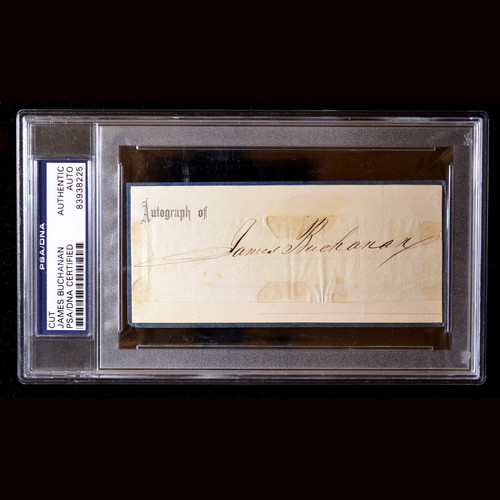James Buchanan Jr. (/ˌbjuːˈkæn.ən/; April 23, 1791 – June 1, 1868) was an American lawyer and politician who served as the 15th president of the United States (1857–1861). He previously served as secretary of state (1845–1849) and represented Pennsylvania in both houses of the U.S. Congress. He was a states' rights advocate, and minimized the role of the federal government in the nation's final years of slavery. Modern historians and critics condemn Buchanan for not addressing the issue of slavery or forestalling the secession of the Southern states over it. Historians and scholars consistently rank him as one of the country's worst presidents.
Buchanan was a prominent lawyer in Pennsylvania and won his first election to the state's House of Representatives as a Federalist. In 1820, he was elected to the U.S. House of Representatives and retained that post for 11 years, aligning with Andrew Jackson's Democratic Party. He served as Jackson's minister to Russia (1832). He won election in 1834 as a U.S. senator from Pennsylvania and also held that position for 11 years. In 1845 he was appointed to serve as President James K. Polk's secretary of state, and in 1853 he was named as President Franklin Pierce's minister to the United Kingdom.
Beginning in 1844, Buchanan became a regular contender for the Democratic party's presidential nomination. He was finally nominated in 1856, defeating incumbent Franklin Pierce and Senator Stephen A. Douglas at the Democratic National Convention; he benefited from the fact that he had been out of the country (as ambassador in London) and thus had not been involved in slavery issues. Buchanan and running mate John C. Breckinridge of Kentucky carried every slave state except Maryland, defeating anti-slavery Republican John C. Frémont and Know-Nothing former president Millard Fillmore to win the 1856 presidential election.
As President, Buchanan intervened in the Supreme Court to gather majority support of the pro-slavery and anti-black decision in the Dred Scott case. He did what Southern leaders wanted in attempting to engineer Kansas coming into the Union as a slave state under the Lecompton Constitution. He thereby angered not only the Republicans but also many Northern Democrats. Buchanan honored his pledge to serve only one term, and supported Breckinridge's unsuccessful candidacy in the 1860 presidential election. He failed to reconcile the fractured Democratic party due to a simmering grudge against Stephen Douglas, leading to a four way electoral split and the election of Republican Abraham Lincoln.
Just weeks after Lincoln was elected as Buchanan's successor, Southern states began seceding from the Union, precipitating the American Civil War. Buchanan's bumbling leadership during his lame duck period was widely criticized. He simultaneously angered the North by not stopping secession, and the South by not acceding to their secession. He supported the ill-fated Corwin Amendment in an attempt to reconcile the country, but it was too little too late. He made an unsuccessful attempt to reinforce the defenders of Fort Sumter, but otherwise refrained from taking any action to prepare the military. His failure to forestall the Civil War has been described alternatively as incompetent inaction, or passive acceptance of the South. Many contemporaries blamed him for the war, and he was much reviled after his presidency. He spent his last years defending his reputation. In his personal life he never married; biographers have variously suggested that he was celibate, homosexual, or even asexual. He died of a cold in 1868, and was buried in Lancaster, Pennsylvania, where he had lived for nearly 60 years.









